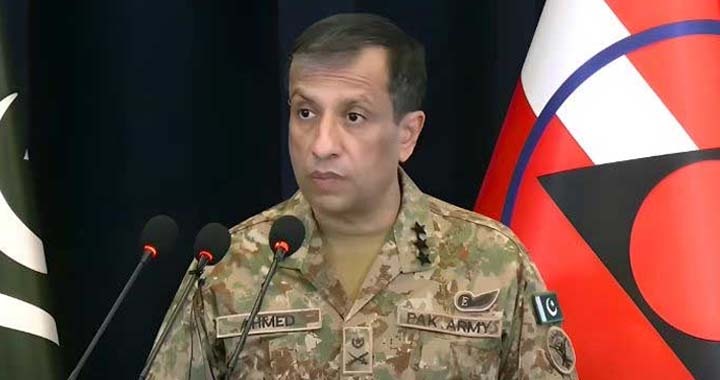Pakistan’s military spokesperson, Lieutenant General Ahmed Sharif Chaudhry, has ruled out any possibility of peace talks with the banned Tehreek-e-Taliban Pakistan (TTP), declaring such negotiations “unworkable” and disastrous for internal stability. Addressing senior journalists, the Director General of Inter-Services Public Relations (ISPR) said that any move by the Khyber Pakhtunkhwa government to reopen dialogue with militants would only spread disorder and undermine national unity.
He stressed that the fight against terrorism is not a matter of political convenience but a shared national cause, recalling that in the decisive phase of the war, the government, cabinet, armed forces and political parties had acted collectively. “The Taliban are killing our security personnel,” he said. “How can talks be held with those who continue to shed the blood of our own soldiers?”
The Real Battle: Breaking the Narco-Terror Network
Lt Gen Ahmed Sharif went on to explain that terrorism today cannot be separated from its financial backbone, the criminal nexus of drug cultivation, smuggling and warlord patronage along the Pakistan-Afghanistan border. He revealed that the TTP and its allied warlords are deeply embedded in the regional drug trade, particularly in opium cultivation, which yields between Rs1.8 and Rs2.5 million per acre. This illicit income, he said, flows through a network that binds militant factions, local warlords, and sections of the population into one economy of violence.
He added that a portion of these profits reaches both the Afghan Taliban and the TTP, allowing them to sustain operations through narco-money and cross-border trafficking. “These groups work together in terrorism, charas and smuggling,” the DG ISPR said, warning that they aim to keep the border porous so that hashish can be freely transported into Pakistan. The proceeds, he added, are now financing militant operations and spreading narcotics deep into Pakistani society — even reaching universities and damaging the youth.
Countering the Economy of Terror
Analysts noted that Lt Gen Sharif’s remarks marked one of the clearest official acknowledgements of the financial underpinnings of terrorism in the region. He said the drug trade was not a marginal issue but the core economic engine sustaining extremist groups, and its eradication would cut off their primary means of survival. “The day these financial lifelines are severed,” he said, “will be the first day of their real defeat.”
He underlined that dismantling this criminal economy requires the strength of the state, not temporary or selective measures. Pakistan, he said, has the will and the capability to confront this menace, but the response must be broad and uncompromising, extending from border interdiction to curbing local networks that provide safe passage and storage.
End of the Illusion
Lt Gen Sharif’s statement also carried a subtle but clear message for those advocating reconciliation with the TTP: dialogue with a criminal-terror enterprise cannot yield peace. He reminded political quarters in KP that appeasement in the past had only allowed terrorists to regroup under the cover of talks, costing thousands of innocent lives. “Any suggestion of negotiations with killers is not only unrealistic but dangerous,” he warned.
The DG ISPR called for a policy pivot that treats drug trafficking, militancy, and smuggling as interconnected threats rather than separate law-and-order problems. He said the time for half measures is over, and only a decisive crackdown on the narco-terror network, from border crossings to city markets, can bring lasting peace to the region.
A Clear Warning and a Way Forward
Observers believe the DG ISPR’s latest briefing is more than a security update, it is a warning to policymakers that the terror economy must be dismantled before militancy can truly end. His remarks signal a growing realisation within the state that counter-terrorism and counter-narcotics are now the same battle.
As Lt Gen Ahmed Sharif concluded, the goal is clear: “When the drug trade and its profits are eliminated, the foundation of terrorism will collapse.”
The message was unmistakable; peace cannot be negotiated with those funded by narcotics, shielded by warlords, and sustained by the blood of Pakistanis.





